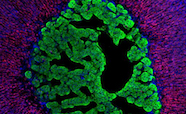The neuroendocrinology of stress
 Researchers in the Centre for Neuroeendocrinology are interested in understanding how neuroendocrine systems control and respond to stress. Research is directed at characterising stress-induced activation of specific neuroendocrine cell populations, and at investigating the integrated neuroendocrinological response to stress under a variety of physiological states.
Researchers in the Centre for Neuroeendocrinology are interested in understanding how neuroendocrine systems control and respond to stress. Research is directed at characterising stress-induced activation of specific neuroendocrine cell populations, and at investigating the integrated neuroendocrinological response to stress under a variety of physiological states.
Hypothalamic neural circuits controlling stress
A diverse range of stressors result in the release of corticotrophin-releasing hormone (CRH) and the subsequent activation of the stress axis. Upstream brain pathways relay stress relevant information to the CRH neurons . Understanding how these circuits are regulated, and how they interact with one another, is crucial for understanding normal stress as well as chronic and abnormal stress responses.
Some of the questions we're examining around the hypothalamic neural circuits controlling stress include:
How do CRH neurons that control the stress response function?
What neural circuits regulate CRH neuron and stress axis excitability?
How do hypothalamic circuits control behaviour?
Neuroendocrine adaptations associated with stress
Acute stress response enables us to cope with physical and psychological threats in our environment. Extended stress responses, however, are an indication of long-term challenges. The brain and body adapt to these types of stress differently, altering functions in order to cope with the perceived challenge. These changes can impact metabolism, cognition, and fertility.
Some of the questions we're examining around neuroendocrine adaptations associated with stress include: